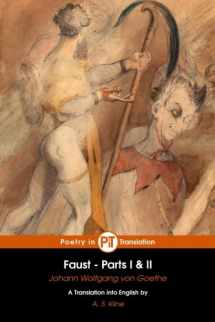
Faust: Parts I & II
Book details
Summary
Description
Faust Parts I & II - Goethe. A translation into English by A. S. Kline with illustrations by Eugène Delacroix.
Goethe’s two-part dramatic work, Faust, based on a traditional theme, and finally completed in 1831, is an exploration of that restless intellectual and emotional urge which found its fullest expression in the European Romantic movement, to which Goethe was an early and major contributor. Part I of the work outlines a pact Faust makes with the devil, Mephistopheles, and encompasses the tragedy of Gretchen, whom Faust seduces. Part II, developed over a long period of Goethe’s later life, reflects Goethe’s own transition from a predominantly Romantic to a wider world-view and explores more extensive themes, including the values of the Classical past, as it moves towards the work’s resolution.
The protagonist, Faust, is presented in a complex manner, and Goethe’s treatment of the subject matter raises ethical and spiritual issues, many of which are not resolved within the drama itself. Goethe’s stress is on Faust’s striving towards the good, and on the nature of human error, rather than on the traditional Christian view of sin and redemption, and the play’s opening sections and its conclusion can be seen as humanist allegory or metaphor rather than an expression of orthodox religious belief. It is left to the reader to draw their own conclusion about Faust’s everyman character, and the extent to which he earns his ultimate spiritual salvation.
The play had an enormous influence on later German thought and literature, and together with his lyric poetry has ensured Goethe’s place among the great European writers.
Published by Poetry in Translation.


We would LOVE it if you could help us and other readers by reviewing the book
Book review



